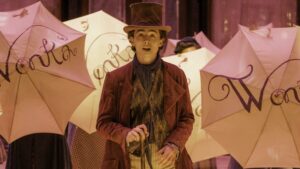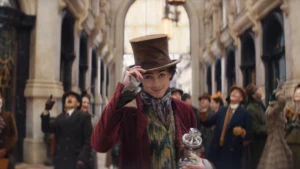Publication Date: 12-14-2023
Wonka (2023) review
Dir. Paul King
By: Steve Pulaski
Rating: ★★★
Wonka serves as a prequel to Willy Wonka & the Chocolate Factory, the 1971 adaptation of Roald Dahl’s novel Charlie and the Chocolate Factory. The initial-box-office-dud-turned-mainstream-classic depicted Gene Wilder as the conniving chocolatier and somewhat contradictory owner/operator of a lavish factory that made confections for children, the very demographic he didn’t appear to like very much. The film’s clever, moralistic punishments for the spoiled rotten children who happened upon a golden ticket inside a fateful Wonka bar was rousing entertainment, and the wonder inspired by the visuals and the story itself cannot be understated.
With all that in mind, it’s fair to ponder where Wonka could’ve gone, especially given it starts before a massive chocolate factory is even a twinkle in the eyes of a young Willy Wonka (played by Timothée Chalamet). While the film doesn’t explain how/when Wonka’s cynicism was birthed, it does dive deep into his entrepreneurial ambitions, his first encounter with an Oompa Loompa, and how an illiterate boy intent on honoring the legacy of his mother laid the foundation for his candy metropolis.

The story begins with Wonka arriving in Europe via boat after a long voyage spent collecting an assortment of rare ingredients all over the world. However, before he can open a chocolate shop in the bustling Galeries Gourmet, he finds himself indebted to the owners of a local inn, Scrubbit (Olivia Colman) and Bleacher (Tom Davis), who trick him into signing a contract, which forces him to live a life of slave labor working in the hotel’s laundry room.
With the help of a precocious orphan girl named Noodle (Calah Lane), Wonka sneaks out every night with a plan in mind: sell enough chocolate that he can buy out his and all the other prisoners’ contracts. He seems to have the recipes down, but what he doesn’t anticipate is the corrupt forces of “Big Chocolate:” Slugworth (Paterson Joseph), Fickelgruber (Matthew Baynton), and Prodnose (Matt Lucas), all of whom ostensibly operating individual chocolate shops but in reality are working together with the help of their own “chocolate cartels.”
Stay with me. The three lecherous businessmen enlist in the help of the Chief of Police (Keegan-Michael Key, who is later aided by a fat-suit), a chocoholic, to stifle Wonka’s candy-making ventures.
Corrupt chocolate? Chocolate cartels? Wonka might occasionally appear, at least visually, like a gritty prequel about the downtrodden and tragic salad days of Willy Wonka, but in reality, it’s a spry affair that revels in its silliness. Director Paul King (who co-wrote the film alongside Simon Farnaby) uses the same touchingly whimsical formula he employed to make both Paddington films major delights. King crafts Wonka like an old-school Broadway musical, and him and Farnaby are aware that introducing gags like Rowan Atkinson as a chocolate-loving priest, or Hugh Grant as a (very English) Oompa Loompa are not successful unless they feel inspired and add camaraderie to the story.

Despite Warner Bros. doing everything they could from a marketing standpoint to bury the fact that Wonka is a musical, it’s a joy to admit that the songs in the film are frequently rousing in their energy and lyricism. Whether it’s the laundry prisoners joylessly singing “Scrub Scrub” as a way to make their thankless work move faster, Wonka’s opening number “A Hatful of Dreams,” or Wonka’s remorseful third act ballad “Sorry, Noodle,” the songs merge sentiment with satisfaction.
I was admittedly skeptical of buying Timothée Chalamet going outside of his comfort zone to play a character as unhinged in his zaniness as Willy Wonka. Chalamet has shown that his good looks don’t often translate to on-screen charisma (Dune: Part One being the most obvious example), but he exhibits a rare outwardly freewheeling energy in Wonka that starts early and never quits. The scenes in which Wonka reflects on his relationship with his mother (Sally Hawkins), who in this adaptation, is not a villain unlike Wonka’s father in Tim Burton’s film, are underscored with poignancy and ring true for anyone blessed enough to have a parent who supported their dreams.
While it might’ve been nice to see his fellow hotel prisoners get their moments, Chalamet effectively dials up his own version of Wonka not yet perverted by cynicism nor malicious intent.
If there’s an issue to be had with Wonka, perhaps it’s one similar to this year’s Haunted Mansion, which ultimately didn’t find a level of success with its human and visual gags that this film does. That nitpick, however, is that the film doesn’t seem to have a clear audience. It might be too murky and grown-up for younger viewers, and adults might scoff at a Wonka with this much “gee whiz” energy. But for the childlike dreamer in all of us, which tends to emerge during the holiday season, this is another invigorating dose of spirited entertainment from Paul King, whose name should be known as well as the bear with whom he made us fall in love.
NOTE: Wonka is now playing exclusively in theaters.
My review of Willy Wonka & the Chocolate Factory (1971)
My review of Charlie and the Chocolate Factory (2005)
Starring: Timothée Chalamet, Calah Lane, Keegan-Michael Key, Paterson Joseph, Matt Lucas, Mathew Baynton, Sally Hawkins, Rowan Atkinson, Jim Carter, Tom Davis, Olivia Colman, Hugh Grant, and Murray McArthur. Directed by: Paul King.
About Steve Pulaski
Steve Pulaski has been reviewing movies since 2009 for a barrage of different outlets. He graduated North Central College in 2018 and currently works as an on-air radio personality. He also hosts a weekly movie podcast called "Sleepless with Steve," dedicated to film and the film industry, on his YouTube channel. In addition to writing, he's a die-hard Chicago Bears fan and has two cats, appropriately named Siskel and Ebert!


